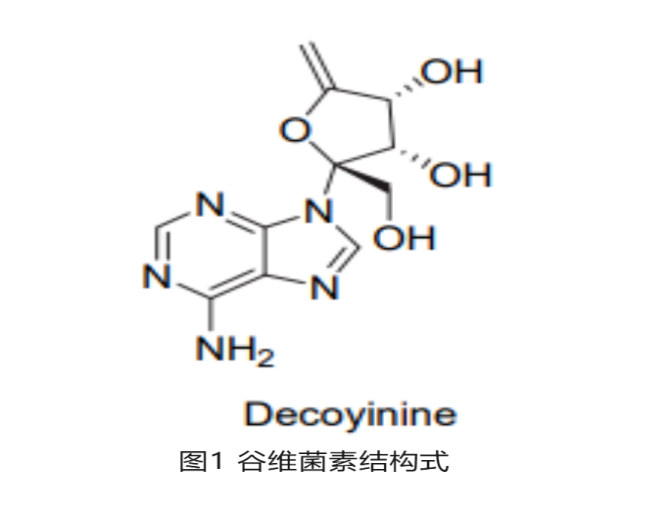
Chemical Structure:

The chemical structure of Decoyinine belongs to the nucleoside class of compounds, though the specific details of its structure have not been fully disclosed. It is produced by fermentation of the plant endophytic actinomycete NEAU6 isolated from the Chinese medicinal herb Paris polyphylla.
Mechanism of Action:
Decoyinine is a plant growth regulator that promotes root branching in plants. Its mechanism of action can be summarized as follows:
- Promotion of Root Branching: Decoyinine significantly stimulates the branching of plant roots, which enhances nutrient and water absorption.
- Long Duration of Effect: The growth-promoting effects of Decoyinine last for up to 60 days, providing a prolonged effect on plant development.
- Stress Resistance Enhancement: Decoyinine improves the plant’s resistance to environmental stresses such as drought, cold, and other unfavorable growth conditions.
- Prevention of Lodging: By enhancing root growth, Decoyinine helps stabilize plants, reducing the likelihood of lodging (falling over).
- Disease Resistance: Decoyinine also boosts the plant’s disease resistance, helping to protect crops from various pathogens.
Applications:
Decoyinine is effective on a wide range of crops, with particularly significant results seen in rice cultivation:
- Rice: Decoyinine promotes seedling emergence, stimulates root growth, increases tiller number, and boosts plant height. It significantly increases the number of effective panicles and grains per panicle, leading to fuller grains and higher yields. Field trials have shown that Decoyinine can increase rice yield by more than 10%. Additionally, it enhances rice’s resistance to diseases and environmental stress, while improving milling yield.
- Other Crops: Decoyinine also shows notable growth-promoting effects on other crops, including chili peppers, bok choy, eggplants, cowpeas, garlic chives, chrysanthemum, corn, potatoes, soybeans, and cotton.
Application Methods:
- Seed Soaking: Decoyinine is typically applied as a seed soaking treatment, with concentrations ranging from 150-300 times dilution.
- Spraying: It can also be applied as a foliar spray to enhance plant growth.
Formulations of Decoyinine include soluble powders, soluble granules, seed treatment liquids, and soluble liquid formulations.
Registration Status:
Currently, Decoyinine has two registered products in China:
- 94% Decoyinine Technical (Product No. PD20212929)
- 1% Decoyinine Seed Treatment Liquid (Product No. PD20212921)
These registrations mean that Decoyinine is now officially available for commercial use in the Chinese market, which lays the foundation for its broader application in agriculture.
Summary and Future Development:
As a new plant growth regulator, Decoyinine has shown great potential in promoting crop growth, enhancing stress resistance, and improving yield. Although there is limited published research on its mechanism, application scope, and interactions with other plant growth regulators, its unique properties and the promising results observed in trials suggest that it will attract significant attention once it becomes more widely available.
Given the relatively limited variety of plant growth regulators compared to herbicides, fungicides, and insecticides, the introduction of a new plant growth regulatory component such as Decoyinine offers more options for agricultural production. As research and understanding of Decoyinine continue to advance, its potential applications in agriculture will expand, contributing to greater food production and sustainability.
Overall, Decoyinine is poised to become a key player in the plant growth regulator market, offering significant benefits in terms of yield increase, disease resistance, and stress tolerance, while helping to meet the growing demand for efficient and sustainable agricultural practices.


